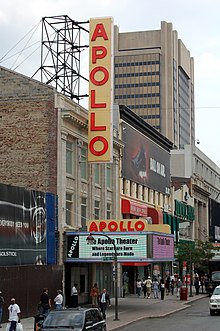Apollo theater
The Apollo Theater at 254 West 125th Street in the New York borough of Harlem is one of the most famous places to perform almost exclusively black music ( jazz , blues , soul , pop and hip-hop ) in the USA . The venue was opened in 1914.
After a dance hall of the same name had existed in New York since the 1870s, the theater on 125th Street (built in 1913) became a burlesque venue in the 1920s ( Hurtig and Seamon's New Burlesque , only renamed Apollo in 1928) ), which, as was customary back then, was only open to whites. In 1932, theater producer Sidney S. Cohen bought the Apollo. In 1934, Cohen opened the Apollo to an African American audience. At the beginning of the 1930s, the area's population was mixed (by the mid-1930s, on the other hand, it was already predominantly Afro-American), and Cohen initially hoped that this opening would not only increase the public, but also save on artist fees by engaging black artists. After Cohen's death in 1935, his partner Morris Sussman took over together with Frank Schiffman, who already ran the Harlem Opera House, the theater, the balcony rows and a total of around 2000 seats. In the Harlem renaissance of the time before World War II, the careers of artists such as Ella Fitzgerald (who was hired by Chick Webb after her appearance on Amateur Night ), Sarah Vaughan and Billie Holiday , who appeared in the regular Amateur Night Shows, began here got their chance. It had its peak as a venue for jazz music in the 1930s and 1940s, when musicians such as Duke Ellington , Louis Armstrong and Count Basie performed here. In 1950, Nat King Cole performed at the Apollo (and was photographed in his dressing room by French photographer Éric Schwab reading Ebony magazine ). The audience was sometimes very critical - Lena Horne, for example, chased it off the stage by throwing pennies at her. It was later also the venue for numerous Motown artists such as Diana Ross , the Jackson 5 and the Supremes, and soul musicians such as Marvin Gaye and James Brown . Brown was laid out in the Apollo after his death in 2006.
The club began to decline in the 1960s and closed in the late 1970s. In 1983, the building was listed and reopened in 1985 with a televised gala Motown Salutes the Apollo . In 1991 it was bought by New York State and from 1992 it was run by the nonprofit Apollo Theater Foundation . Events for young talent Showtime at the Apollo and the Apollo Amateur Night every Wednesday take place here . The first phase of extensive restoration began in December 2005.
After Michael Jackson's death , thousands of fans gathered at the Apollo Theater. It was one of the first stops in Michael Jackson's career (together with his family as The Jackson Five ). He attended and won the Amateur Night in the late 1960s.
The theater also serves as a backdrop for film premieres (e.g. Downtown - A street tale ) and political events such as the 2002 Bill Clinton's Democratic National Committee fundraiser.
It is one of the main attractions in Harlem and is open to visitors for historical tours.
Web links
Individual evidence
- ↑ https://www.apollotheater.org/about/history/
- ↑ Yves Gacon: Eric Schwab, photographing the unspeakable , Agence France-Presse (Paris), February 13, 2015 (Eng.)
Coordinates: 40 ° 48 ′ 35.6 ″ N , 73 ° 57 ′ 0.5 ″ W.

